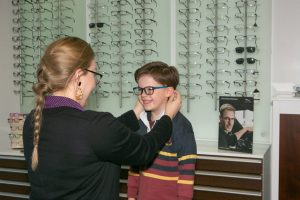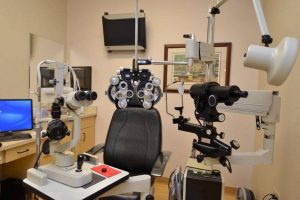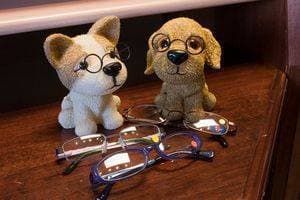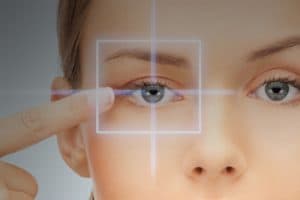Does my Baby have a Vision Problem?
Infant eye exams are essential to ensure your baby’s visual development meets their developmental milestones. Most baby’s eyes are assessed by a neonatologist within a
Read MoreChildren’s Vision: FAQs
These are the 5 most frequent questions asked to eye doctors on children’s vision. You may easily find answers to your questions below. If you still have questions, contact your nearest eye doctor experienced in children’s vision.
Read More7 Common Pediatric Eye Conditions
Almost 20% of American children under 18 have a diagnosed eye or vision condition. Diagnosing eye problems in childhood can help minimize potential damage and makes treatment faster and more effective. That’s why parents should know about the most common pediatric eye problems and their symptoms.
Read MoreAre Micro-Prisms the Answer for BVD?
Has your eye doctor prescribed micro-prism lenses? Micro-prisms lenses are fast becoming the optimal treatment for people with Binocular Visual Dysfunction, BVD. With healthy binocular
Read MoreVision and Autism: Part 2
Author: Randy Schulman, MS, OD, FCOVD As vision is key to so many other systems, vision intervention, such as vision therapy, can have a profound
Read MoreVision and Autism: Part 1
Author: Randy Schulman, MS, OD, FCOVD This year marks my 30th year as an optometrist and during all of those years I have seen thousands
Read MoreNearsighted or Farsighted?
Have you been told you are ‘nearsighted’ or ‘farsighted’ but not totally sure what they mean? Both of these may require you to rely on
Read MoreWhat Are Visual Efficiency Problems?
Poor visual efficiency skills can negatively impact performance in school, at the office, and on the sports field. Understanding and knowing what to look out for can help with early detection and treatment of visual problems – leading to improved school grades and sports achievements.
Read MoreVision Therapy for Concussions
Up to 90% of people experience vision problems after experiencing a concussion. The symptoms that persist following a concussion are collectively called Post Trauma Vision
Read MoreWhat to Do Before an Eye Exam?
About to come in for your eye exam? To get the most out of your visit, start preparing with these 4 tips. If you’re experiencing
Read MoreWhich Eye Conditions Can Affect Learning?
According to the College of Optometrists In Vision Development (COVD), 25% of all children have an undiagnosed vision problem impacting their school grades. If your
Read MoreCould a Child with ‘20/20 Sight’ Have a Vision Problem?
Studies have found that 1 out of 4 school children suffer from a vision problem that impacts their learning. If your child has 20/20 vision,
Read MoreCan you Improve your Child’s Academic Performance?
Did you know that 80% of the information you learn comes through your vision? If your child struggles to read or keep up with their
Read MoreSandwiches and Vision Therapy?
A ‘sandwich’ is when pieces work better together, than each piece on its own … but what has this to do with vision therapy? This
Read MoreDoes Amblyopia (Lazy Eye) Affect Eye-Hand Coordination?
What is a lazy eye and how does it develop? Amblyopia, commonly known as lazy eye, is a neuro-developmental vision condition that begins in early
Read MoreWhat Is Intermittent Strabismus?
Strabismus, also called an eye turn, can be intermittent or constant— depending on how often it occurs. Intermittent strabismus occurs occasionally, most often during stressful
Read MoreStrabismus Surgery
What is strabismus surgery? Strabismus, also known as “crossed-eyes” occurs when the two eyes are unable to achieve proper alignment to focus on an object.
Read MoreConvergence Insufficiency FAQs
Q1: What is convergence insufficiency (CI)? A: Convergence insufficiency is a highly treatable binocular vision condition that affects near vision and eye muscle coordination. Convergence
Read MoreEyecare for Children
Eyecare for Children Are you worried about your child needing glasses? Do you want to understand why your child needs bifocals or multifocals? Are you
Read MoreBifocals for Lazy Eye
What are bifocals? Bifocals are glasses that contain two lens prescriptions, one for near vision and one for distance vision. The lens powers are usually
Read MoreA Guide to Children’s Eye Diseases
As your child grows older, annual exams are crucial to ensure that their eyes continue to develop normally, and to detect any changes in vision or ocular health. Importantly: vision screenings conducted by schools are not a substitute for a comprehensive eye exam – ocular diseases and many vision problems cannot be identified through a screening.
Read MoreNeuro-Optometry
Have you suffered a traumatic brain injury (TBI) or concussion and still experiencing vision problems? TBIs can cause double vision, blurriness, headaches and eye strain, these can be successfully treated with a personalized vision therapy program.
Read MoreVision Therapy for Children
Are your child’s school grades not a true reflection of their potential? Has your child been told they have a learning or attention difficulties?
The problem could be with their eyes or visual skills and vision therapy might the solution you have been looking for.
Vision and Vestibular Dysfunction
Do you often experience dizziness or feel as though the world is spinning around you (vertigo)?
Do you experience motion sickness, or a persistent sense of unsteadiness or imbalance? You may have an inner ear disturbance called Vestibular Dysfunction. The good news is that these symptoms can be significantly reduced with vision therapy, allowing you to regain your quality of life.
Vision Therapy for TBI Related Vision Conditions
How does a TBI affect vision? Vision is the most important source of sensory information. Consisting of a sophisticated complex of subsystems, the visual process
Read MoreCommon Vision Problems Associated With a Brain Injury
Over 10 million traumatic brain injuries (TBI) occur annually, worldwide. Approximately 2.8 million, close to 1 in 100, Americans suffer a form of TBI every
Read MoreVision and Brain Injuries
Can the eyes and visual system be affected by a brain injury? Yes, Traumatic brain injury (TBI) can result in significant vision problems, unfortunately these often remain undiagnosed for years, dramatically impacting the quality of life.
Read MoreEye Conditions That Cause Strabismus
Many common eye conditions can lead to an eye turn. Eye turns affect over 3 people in 100 and can be successfully treated by eye doctors, often without needing complex eye surgery.
Read MoreStrabismus FAQs
Q: Is strabismus surgery the only treatment option for an eye turn? A: No. Strabismus treatment options depend on the type of strabismus— direction of
Read MoreWhat Is Exotropia?
Exotropia is a common form of strabismus characterized by an outward eye turn, away from the nose. Exotropia is a eye turn where one eye points outwards, this may be noticed while the child is looking at distance objects, near objects or both.
Read MoreWhat Is Esotropia?
Esotropia is a form of strabismus (crossed-eyes) that is caused by an inward turn of the eye, toward the nose. This condition can be constant or intermittent and cause an individual to appear ‘cross-eyed’.
Read MoreWhat Is Strabismus (Crossed-Eyes)?
Up to 5% of the population has strabismus, or an eye turn. Strabismus occurs when the two eyes are unable to maintain proper alignment and focus together on an object – one eye looks directly at the object, while the other eye points in a different direction.
Read More





























